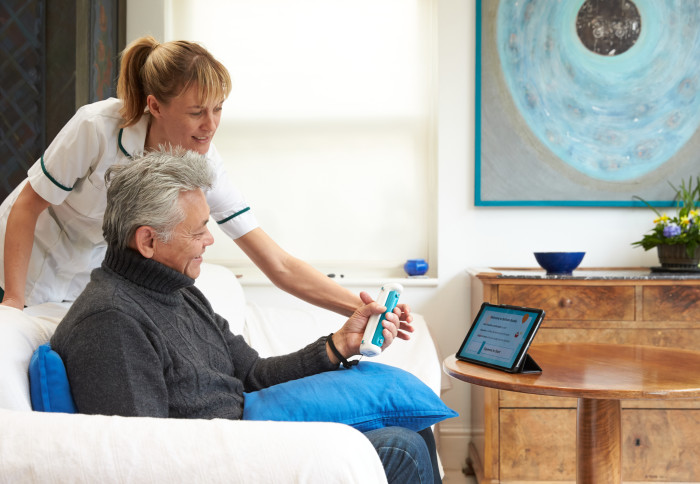Imperial College Innovation Fund backs GripAble in latest funding round
by Gavin Reed

The Imperial College Innovation Fund has invested £250,000 in a startup delivering upper limb rehabilitation to patients in hospital and at home
GripAble, a London-based startup launched at Imperial College London and focused on digitising upper limb rehabilitation for patients with arm weakness, has announced the successful close of its £1.6 million pre-Series A funding round.
The Imperial College Innovation Fund (ICIF), an early-stage investment fund launched at Imperial in early 2020, invests in startup companies with a strong connection to Imperial College London, such as those founded by students, members of staff or alumni, or companies which have engaged extensively with Imperial’s entrepreneurial ecosystem.
Established in 2017 by Imperial researchers Dr Paul Rinne (Departments of Bioengineering and Medicine), and Dr Mike Mace (Bioengineering), GripAble has developed a digital platform that incorporates hand-held sensors, software and data services to support upper limb rehabilitation for patients with arm weakness.
Imperial College Innovation Fund invested £250,000 in the £1.6 million round, which was led by Triple Point Ventures with additional funding from the Oxford Technology Fund.
Arm weakness can be caused by a range of conditions, including musculoskeletal disorders or brain damage, such as stroke, and it affects over 5 million people in the UK alone. Limited arm movement impinges severely on quality of life, making everyday tasks such as opening a jar, pouring water, getting dressed and eating more difficult.
Rehabilitating arm movement is possible through guided physiotherapy treatment, usually involving many repetitions of a variety of exercises each day. In the case of neurological conditions, repeated movements activate new neural pathways to replace those that have been damaged or destroyed.
The gold standard of care is delivered through one-to-one therapy and makes use of tools such as wooden blocks and putty. This level of treatment is expensive and has become increasingly difficult to deliver during the COVID-19 pandemic. Furthermore, patients are often unmotivated and may find it difficult to complete exercises – and when they do, therapists find it difficult to accurately track results and monitor improvement.
GripAble has developed a hand-held sensor that is used by patients to control a range of digital games and applications. The device is sensitive to a range of types of movement, such as squeezing, turning or lifting, and these are used as inputs for games designed to hold patients’ attention and encourage them to complete exercises. GripAble has paired this innovation with a data system that allows therapists to monitor patient progress, set goals, and deliver a greater level of personalised attention than is usually possible with remote rehabilitation.

Dr Paul Rinne, CEO and co-founder of GripAble, said: “It is a challenging task to build a product for both neurological and musculoskeletal disorders, for individuals of all ages and with all ranges of cognitive abilities, but we have succeeded in delivering to market a product with incredibly broad applicability by putting the users – therapists and patients – front and centre of everything we do.”
Brijesh Roy, Seed Investment Manager at Imperial, said: “GripAble’s progress to date demonstrates the considerable patient benefits achievable through academic entrepreneurship. GripAble’s driven leadership team have developed great technology and worked closely with healthcare providers and patients to bring to market an innovative solution for an acute unmet need. We are excited to support the company through scale-up and their forthcoming US launch.”
The company plans to use funds raised in this pre-Series A round to further scale its assessment and training platform in the UK and Europe in preparation for its US market launch. GripAble has also announced its Series A fundraising, which will close in Q3 2021.
Article text (excluding photos or graphics) © Imperial College London.
Photos and graphics subject to third party copyright used with permission or © Imperial College London.
Reporter
Gavin Reed
Enterprise